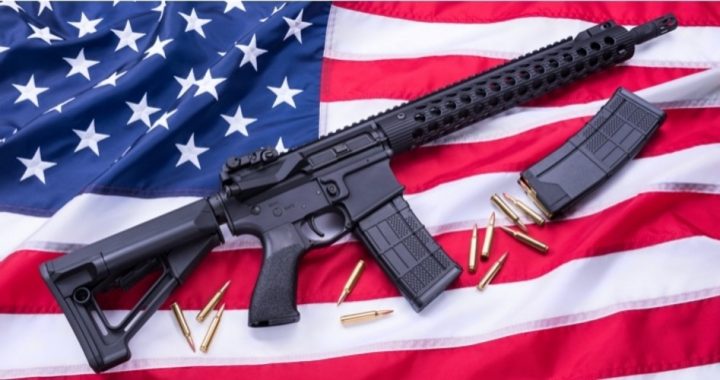
The Los Angeles County sheriff has reversed his decision to order deputies to close gun shops after the county’s lawyer said the shops could remain open.
Fears stemming from the coronavirus crisis have prompted Americans to turn to the Second Amendment for security, but Los Angeles County Sheriff Alex Villaneuva used the county’s stay-at-home order to deem gun stores nonessential businesses and force them to close, even sending deputies to the shops to enforce the order.
Fox News reports Sheriff Villaneuva, who is also the official director of emergency operations during times of crisis, admitted he was compelled to take action by an influx of first-time gun owners purchasing weapons. He later defended his statement by claiming the increase in first-time buyers was infringing on social-distancing requirements, though it’s unclear what one has to do with the other.
“We will be closing them, they are not an essential function,” Villanueva said on Tuesday. “I’m a supporter of the 2nd amendment, I’m a gun owner myself, but now you have the mixture of people that are not formerly gun owners and you have a lot more people at home and anytime you introduce a firearm in a home, from what I understand from CDC studies, it increases fourfold the chance that someone is gonna get shot.”
But as noted by Associated Press, neither the county’s stay-in-place order, nor an executive order from California Governor Gavin Newsom, specifically addressed gun shops. Hours after Villaneuva’s order to close the shops, the Los Angeles County counsel’s office issued a statement saying it has determined “gun stores qualify as essential businesses.” Shortly after that, Villaneuva’s department announced it had suspended efforts to close the shops.
Gun-rights advocates in the state are considering taking legal action against the Sheriff’s Department.
“There are far more important things that the sheriff can be doing than sending uniformed officers to gun stores telling them they’re going to be shut down by force,” said Sam Paredes, executive director of Gun Owners of California.
Los Angeles is not the only city in California to target first-time gun buyers. According to the Mercury News, San Jose ordered the closure of gun stores last week, claiming concerns over panic-buying.
“We are having panic buying right now for food,” said San Jose Mayor Sam Liccardo. “The one thing we cannot have is panic buying of guns.”
Ironically, according to the Daily Caller, the closure of the gun stores prompted further panic-buying of guns hours before the stores were shut down.
San Jose citizens were angered by the city’s decision to shut down gun stores.
“Essential? It’s our right to arm ourselves,” said San Jose painting contractor Joshua Wolfe, who was purchasing ammunition at Bullseye Bishop just before the shop was closed, adding he felt the need to be adequately armed because of concerns that those who are “short on supplies” will “come after people who are prepared.”
J.V. Sumabat shared those same concerns. “I’ve seen people fighting over toilet paper. I’m worried what they will do out of desperation,” he said. “When people start looting stores and they don’t have access to food, they could come into the homes of those they feel are vulnerable. I’d rather be prepared.”
A similar order has prompted the closure of gun shops in Alameda County as well, AP reports.
Sadly, this government overreach is not limited to California.
Connecticut Governor Ned Lamont issued an executive order closing non-essential businesses, including gun shops, in his state, and Wake County, North Carolina, Sheriff Gerald Baker announced he would be suspending new applications for pistols and concealed-carry permits until the end of April because of the “unprecedented” demand. The state of New Jersey is currently being sued for violating the Second Amendment because Governor Philip D. Murphy’s March 21 executive order ordered the closure of all nonessential retail businesses, including firearms businesses.
Gun retailers across the country have reported spikes in gun and ammunition sales in recent weeks as mass hysteria generated by the media and various health organizations over the coronavirus has reached a fever pitch.
Ammo.com, an online retailer of ammunition, saw a 434-percent increase in transactions from February 23 to March 23, and a 720-percent increase in revenue during that time period compared to the previous 30 days. The Tampa Bay Times compared the number of background checks processed from March 9 to March 15 of this year to the same time periods in the previous eight years and found a 75-percent increase. Forbes reports firearm background checks from February 21, 2020, to March 1, 2020 were at the third-highest level since 1998 — reaching 797,221.
Panic buying of high-demand items such as toilet paper, food, and hand sanitizer have led to empty store shelves, creating fears that looting may come next.
Frank Miniter, editor in chief of the NRA’s America’s 1st Freedom magazine, contends an increase in gun sales is common during a crisis.
“During national emergencies, gun and ammunition sales go up. This is a practical thing. Self-reliance is what communities rely on,” he said. “The rise in gun sales is the practical nature of Americans coming out.”
Others are motivated by concerns that the government will use this crisis to infringe upon Second Amendment-guaranteed rights — exactly what is happening in areas such as Los Angeles and San Jose.
Kris Parnto, former U.S. defense contractor, Army Ranger, and owner of Battleline Tactical, contends that the spike in gun sales is triggered not only by fears of looting and concerns over self-defense, but by panic that the government will use this crisis to forcibly remove gun rights.
“I know there is a general distrust of the government, no matter which party is in charge, since gun control is always at the forefront. Uncertainty can easily turn into panic without positive reassurance,” he said. “This leads to panic in the general populace; people worry that the government will forcibly take away their rights assured by the Constitution, or they panic over the shortage of items that have become necessities in our daily lives.”
Image: Olga Mendenhall via iStock / Getty Images Plus
Raven Clabough acquired her bachelor’s and master’s degrees in English at the University of Albany in upstate New York. She currently lives in Pennsylvania and has been a writer for The New American since 2010.




